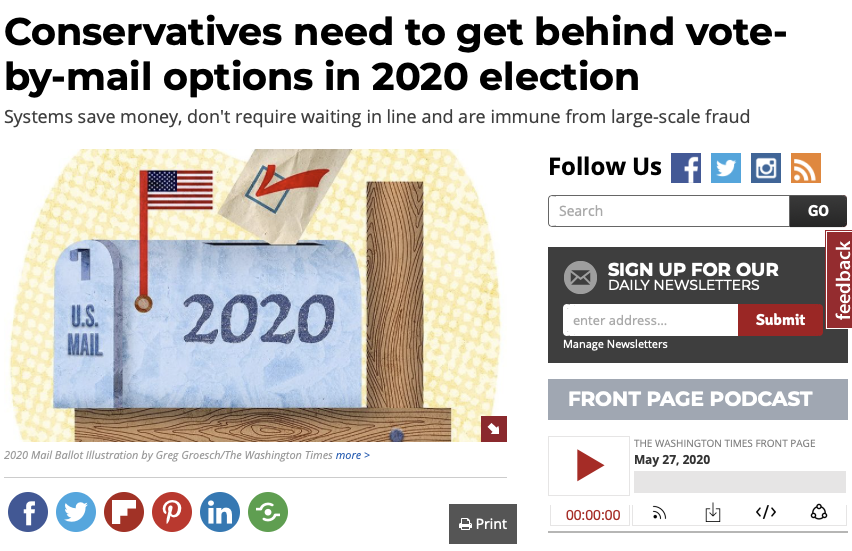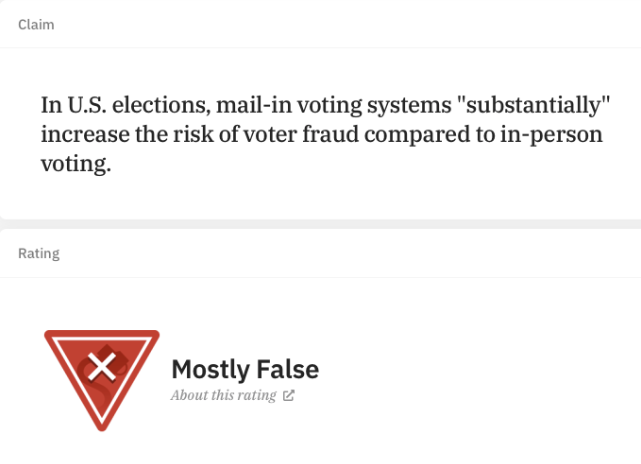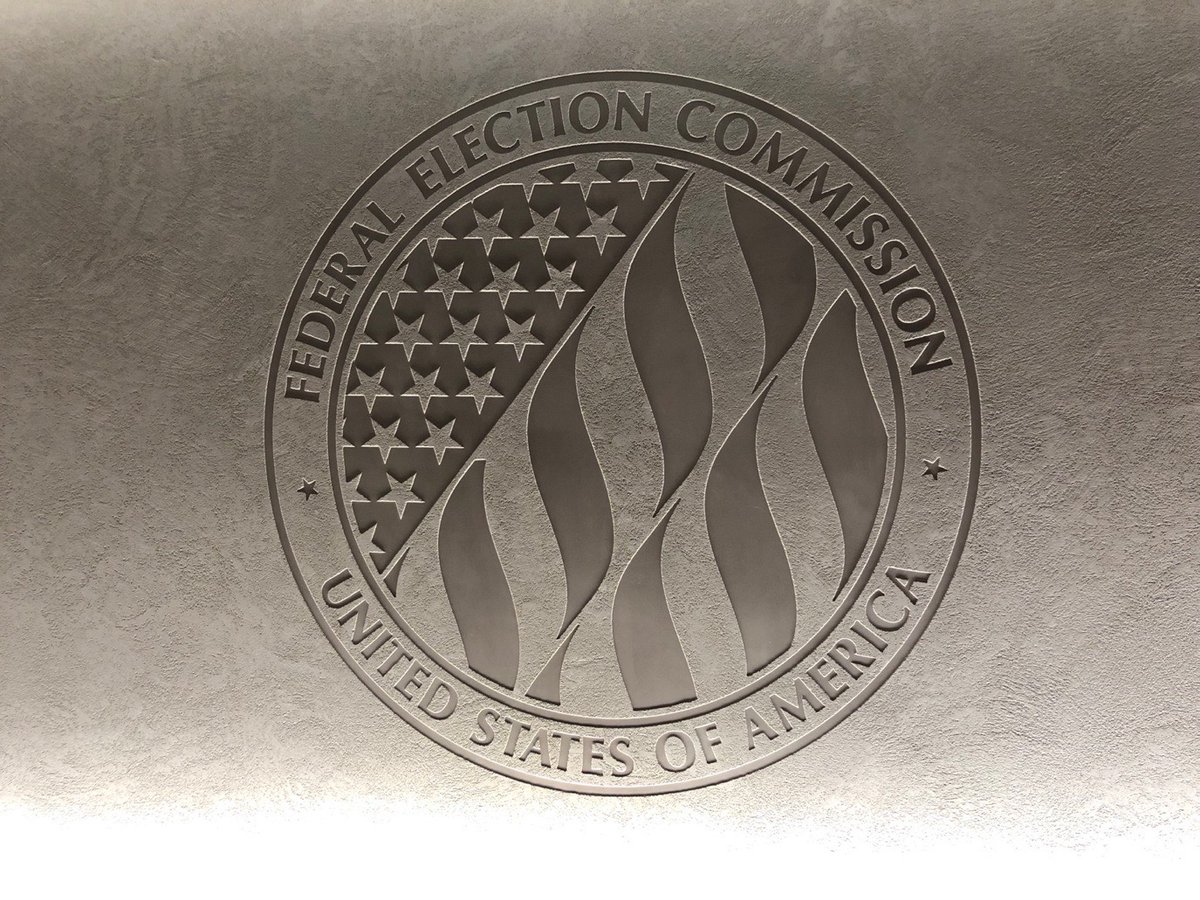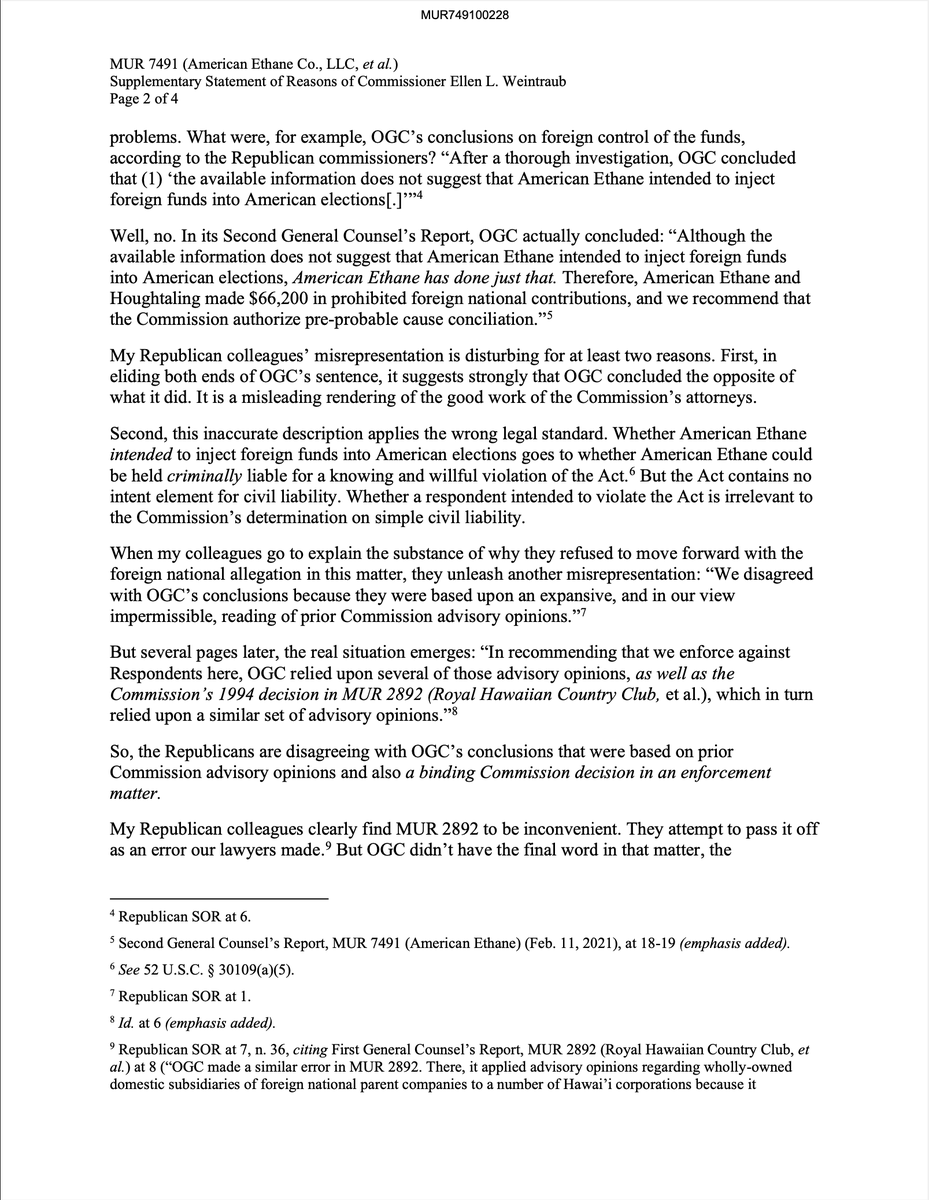🚨🚨🚨Thread!
Buckle up.
1/66
It’s been claimed that voting by mail leads to massive corruption and fraud. But what are the facts?
Buckle up.
1/66
It’s been claimed that voting by mail leads to massive corruption and fraud. But what are the facts?
2/
U.S. citizens will vote by mail this year in record numbers. In the face of a global health emergency, election officials across the country from both parties are working heroically to ensure that voting by mail is accurate, accessible, safe & secure.
U.S. citizens will vote by mail this year in record numbers. In the face of a global health emergency, election officials across the country from both parties are working heroically to ensure that voting by mail is accurate, accessible, safe & secure.
3/
There's simply no basis for the conspiracy theory that voting by mail causes fraud. None.
@CNN & @washingtonpost fact-checks show this. But many others have examined the issue and arrived at the same conclusion. Still others have provided some key context. Take a look!
There's simply no basis for the conspiracy theory that voting by mail causes fraud. None.
@CNN & @washingtonpost fact-checks show this. But many others have examined the issue and arrived at the same conclusion. Still others have provided some key context. Take a look!
5/
And here is @washingtonpost's fact-check, also cited by @Twitter:
washingtonpost.com/politics/2020/…
And here is @washingtonpost's fact-check, also cited by @Twitter:
washingtonpost.com/politics/2020/…
6/
And here are a few more:
@CBSNews political reporter @Grace_Segers:
And here are a few more:
@CBSNews political reporter @Grace_Segers:
https://twitter.com/Grace_Segers/status/1265264320860114946
14/
U.S. Election Assistance Commission White Paper: Deep Dive on Early, Absentee, and Mail Voting (@EACgov):
eac.gov/documents/2017…
U.S. Election Assistance Commission White Paper: Deep Dive on Early, Absentee, and Mail Voting (@EACgov):
eac.gov/documents/2017…

16/
Thread from @BrennanCenter & @nyulaw Professor Michael Li (@mcpli):
Thread from @BrennanCenter & @nyulaw Professor Michael Li (@mcpli):
https://twitter.com/mcpli/status/1264583397864808455
17/
All types of voter fraud in U.S. elections are minuscule in comparison to the number of ballots cast, according to elections experts (@BrennanCenter):
brennancenter.org/our-work/analy…
All types of voter fraud in U.S. elections are minuscule in comparison to the number of ballots cast, according to elections experts (@BrennanCenter):
brennancenter.org/our-work/analy…
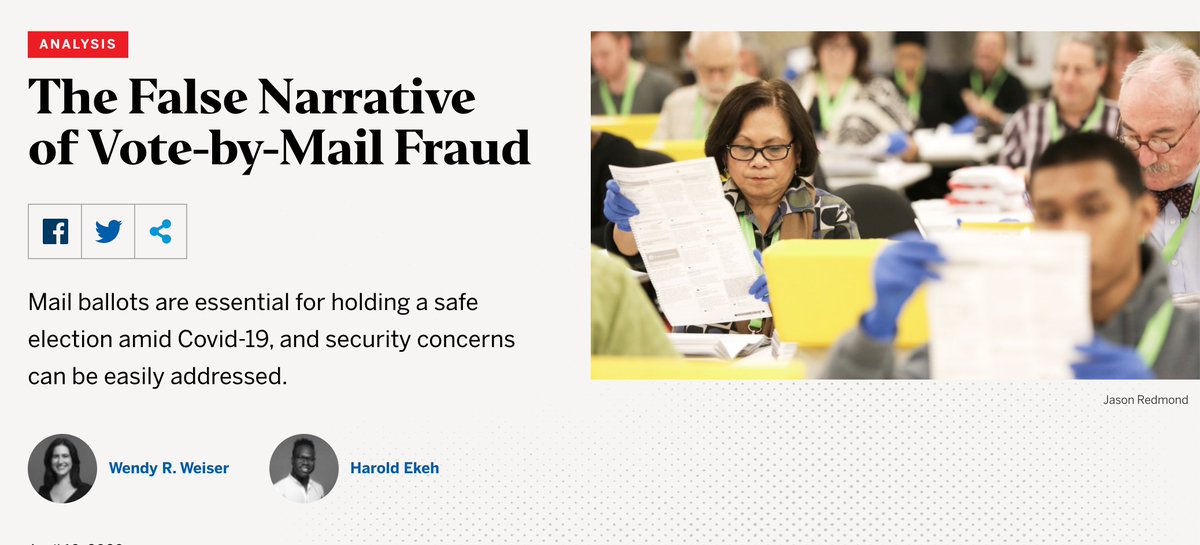
18/
@Reuters poll finds that 72% of all U.S. adults, including 65% of Republicans, support a requirement for mail-in ballots to protect voters (@Cmkahn):
reuters.com/article/us-usa…
@Reuters poll finds that 72% of all U.S. adults, including 65% of Republicans, support a requirement for mail-in ballots to protect voters (@Cmkahn):
reuters.com/article/us-usa…

19/
@IssueOneReform Co-Chair @IOWamp (Former Rep. R-TN):
@IssueOneReform Co-Chair @IOWamp (Former Rep. R-TN):
https://twitter.com/IOWamp/status/1265608087265857536
20/
In 2016, roughly 1 in 4 voters cast their votes via mail-in ballot (@voteathome):
docs.wixstatic.com/ugd/ef45f5_81a…
In 2016, roughly 1 in 4 voters cast their votes via mail-in ballot (@voteathome):
docs.wixstatic.com/ugd/ef45f5_81a…

21/
"Oregon has mailed out more than 100 million ballots since 2000, with about a dozen cases of proven fraud; a 0.000012 percent rate" (@drvox for @voxdotcom):
vox.com/policy-and-pol…
"Oregon has mailed out more than 100 million ballots since 2000, with about a dozen cases of proven fraud; a 0.000012 percent rate" (@drvox for @voxdotcom):
vox.com/policy-and-pol…
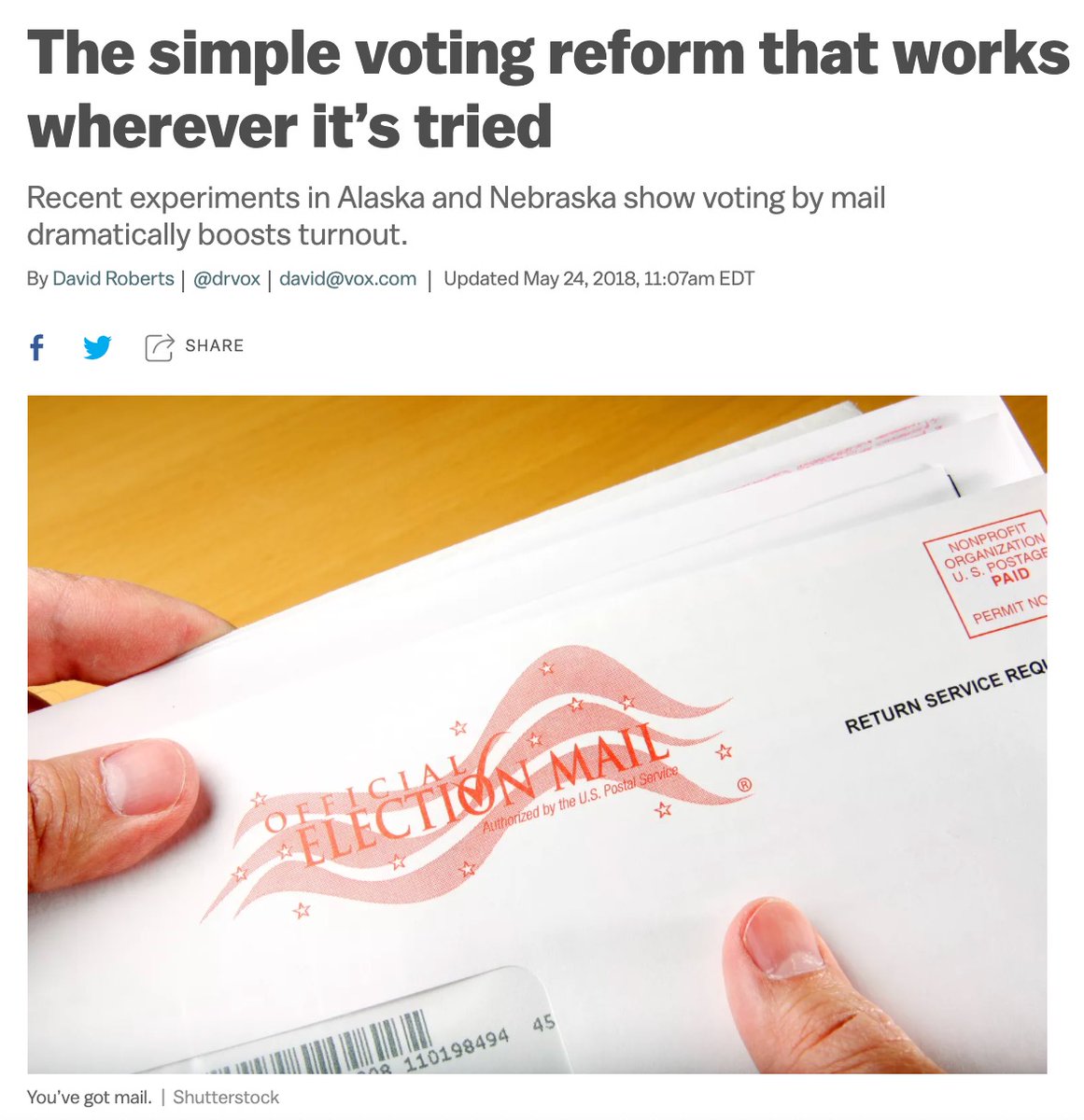
22/
President disbanded his own commission charged with investigating voter fraud in 2018, without producing any systemic evidence of fraud. @miwine & @tackettdc for @nytimes:
nytimes.com/2018/01/03/us/…
President disbanded his own commission charged with investigating voter fraud in 2018, without producing any systemic evidence of fraud. @miwine & @tackettdc for @nytimes:
nytimes.com/2018/01/03/us/…
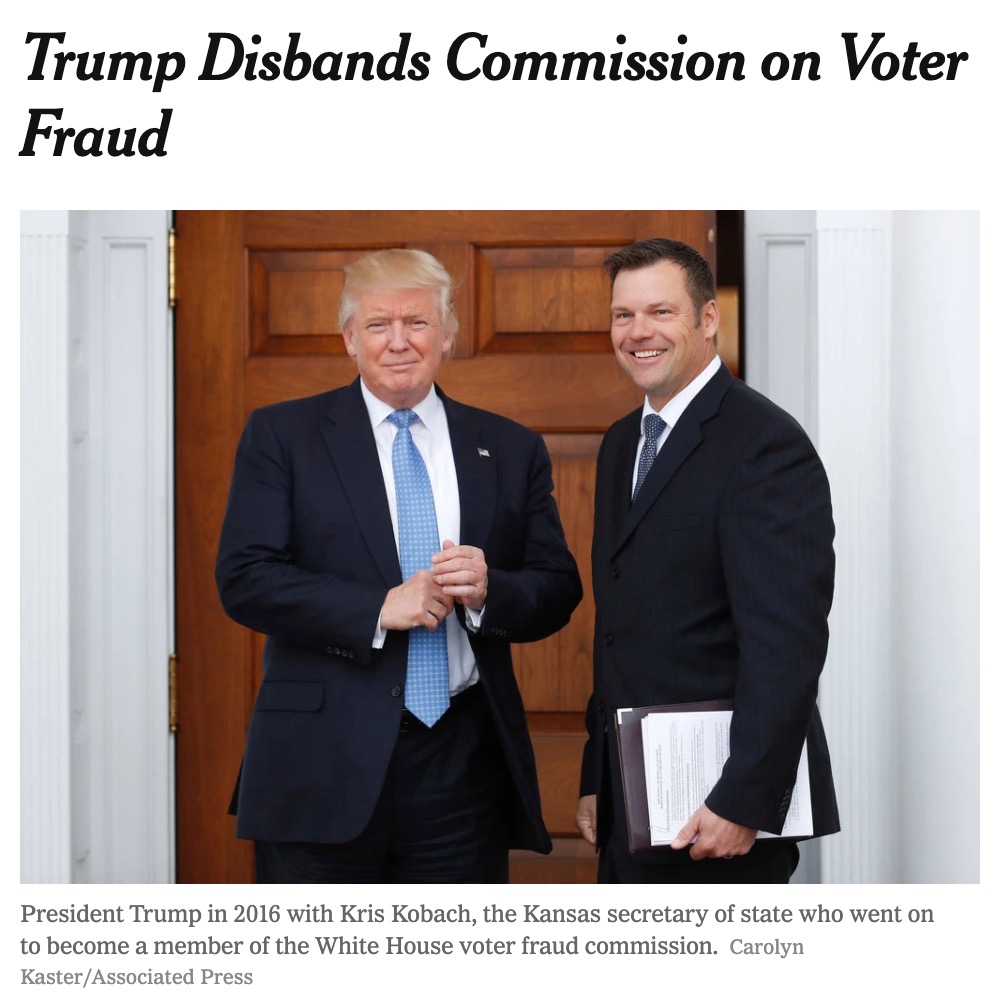
23/
"Deeply conservative Utah has moved almost entirely to vote-by-mail in recent years" (@aseitzwald & @sahilkapur for @NBCNews):
nbcnews.com/politics/2020-…
"Deeply conservative Utah has moved almost entirely to vote-by-mail in recent years" (@aseitzwald & @sahilkapur for @NBCNews):
nbcnews.com/politics/2020-…
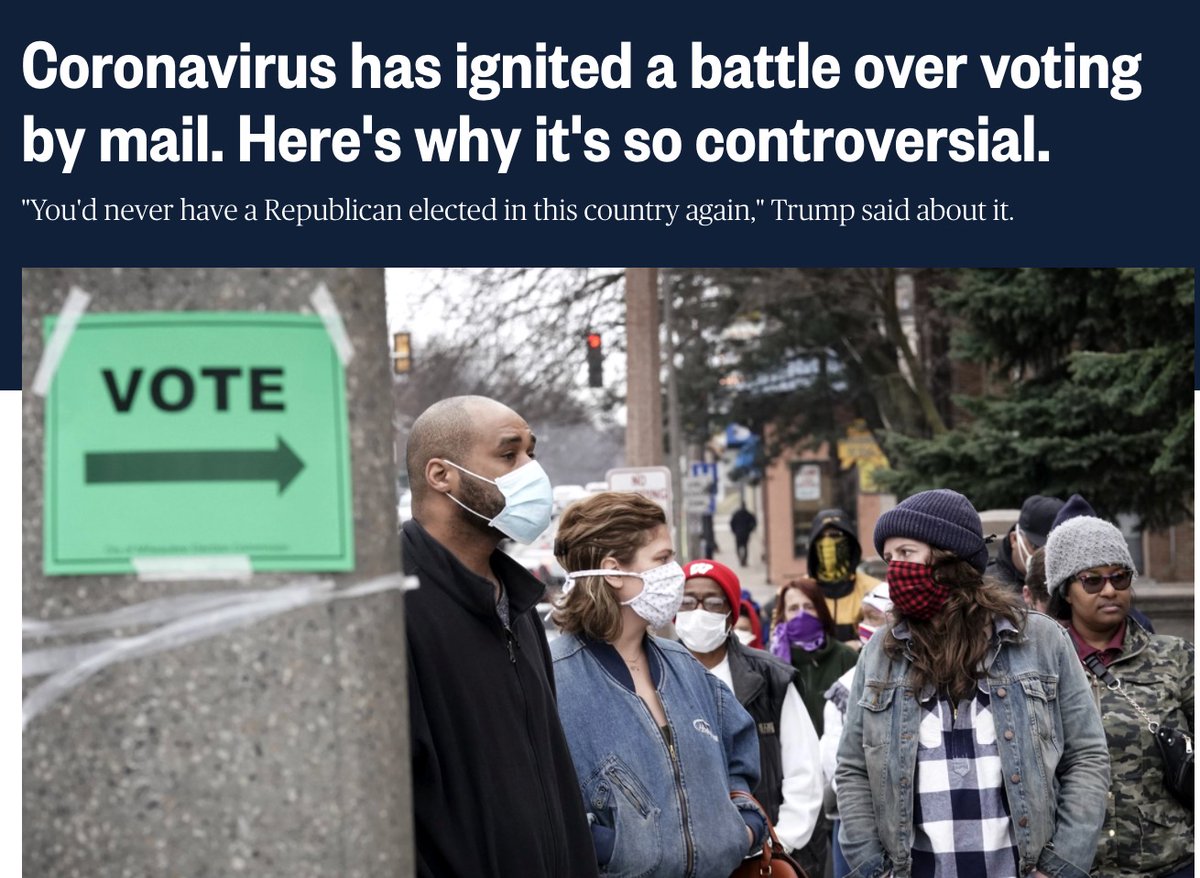
24/
President requests vote-by-mail ballot for Florida Republican presidential primary (@mannahhorse for @pbpost):
palmbeachpost.com/news/20200311/…
President requests vote-by-mail ballot for Florida Republican presidential primary (@mannahhorse for @pbpost):
palmbeachpost.com/news/20200311/…
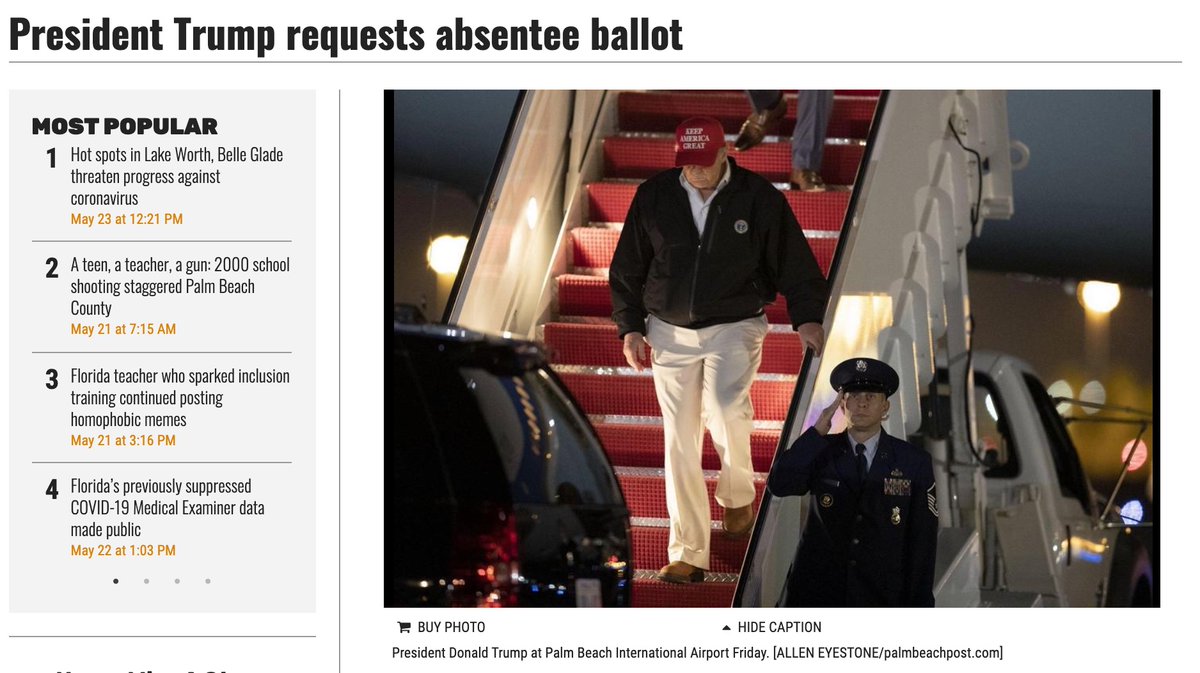
25/
Fox News Anchor Chris Wallace: "I've done some deep dive into it, there really is no record of massive fraud or even serious fraud from mail-in voting." "It's being carried out in Republican states, it's being carried out in Democratic states."
Fox News Anchor Chris Wallace: "I've done some deep dive into it, there really is no record of massive fraud or even serious fraud from mail-in voting." "It's being carried out in Republican states, it's being carried out in Democratic states."
https://twitter.com/kylegriffin1/status/1264896497268768768
26/
From more than a billion votes cast between 2000 and 2012, there were only 491 cases of absentee-voter fraud (@news21 Voting Rights Project):
votingrights.news21.com/article/about/
From more than a billion votes cast between 2000 and 2012, there were only 491 cases of absentee-voter fraud (@news21 Voting Rights Project):
votingrights.news21.com/article/about/

27/
Parties are virtually equal in percentages of who votes by mail (@cstewartiii for @Caltech):
electionupdates.caltech.edu/2020/03/20/som…
Parties are virtually equal in percentages of who votes by mail (@cstewartiii for @Caltech):
electionupdates.caltech.edu/2020/03/20/som…
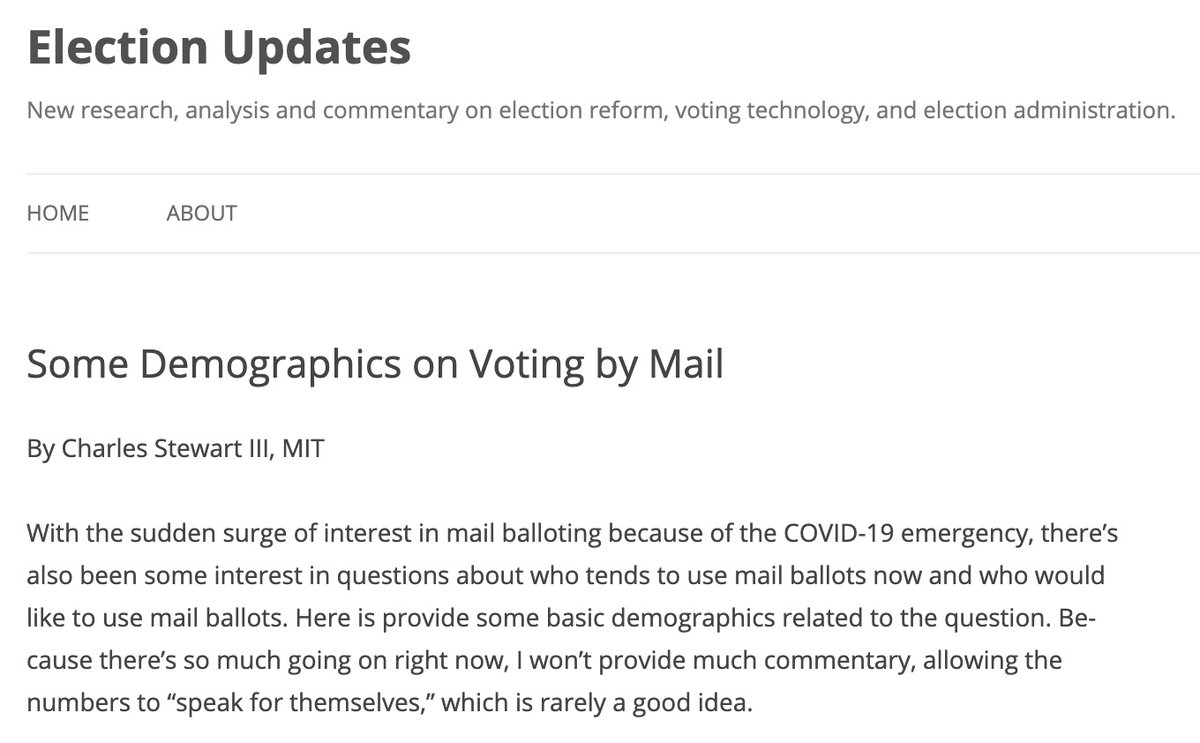
28/
@NBCNews White House Correspondent @GeoffRBennett:
@NBCNews White House Correspondent @GeoffRBennett:
https://twitter.com/GeoffRBennett/status/1265620820208029702
29/
Author and @ucl Professor @brianklaas:
Author and @ucl Professor @brianklaas:
https://twitter.com/brianklaas/status/1265260640039587842
30/
GOP state officials warming to vote-by-mail (NE, OH, WV, IA); Iowa Republican SoS Paul Pate: sowing “doubt about the integrity of the process is as dangerous as vote fraud" (@NickRiccardi for @AP):
apnews.com/4cf54df2ab65b4…
GOP state officials warming to vote-by-mail (NE, OH, WV, IA); Iowa Republican SoS Paul Pate: sowing “doubt about the integrity of the process is as dangerous as vote fraud" (@NickRiccardi for @AP):
apnews.com/4cf54df2ab65b4…
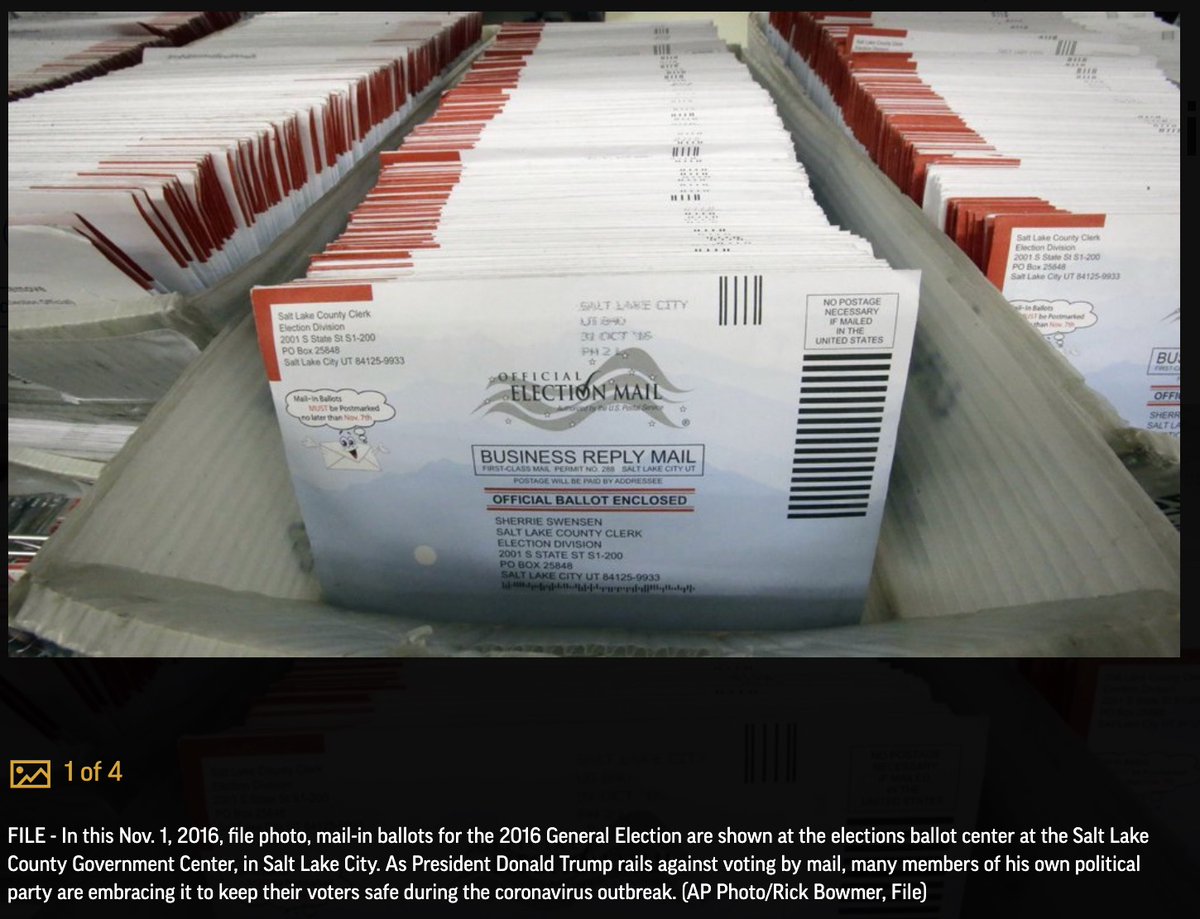
31/
Mistake, not fraud: "Fraud by individual voters is almost nonexistent; mistakes in a confusing system are the real issue" (@Rutgers_Camden Professor Lorraine C. Minnite):Â
scholars.org/sites/scholars…
Mistake, not fraud: "Fraud by individual voters is almost nonexistent; mistakes in a confusing system are the real issue" (@Rutgers_Camden Professor Lorraine C. Minnite):Â
scholars.org/sites/scholars…

32/
@BrennanCenter's "The Truth About Voter Fraud" found that even among the small number of reported incidents of 'fraud,' most turn out to be traceable to other causes:
brennancenter.org/sites/default/…
@BrennanCenter's "The Truth About Voter Fraud" found that even among the small number of reported incidents of 'fraud,' most turn out to be traceable to other causes:
brennancenter.org/sites/default/…
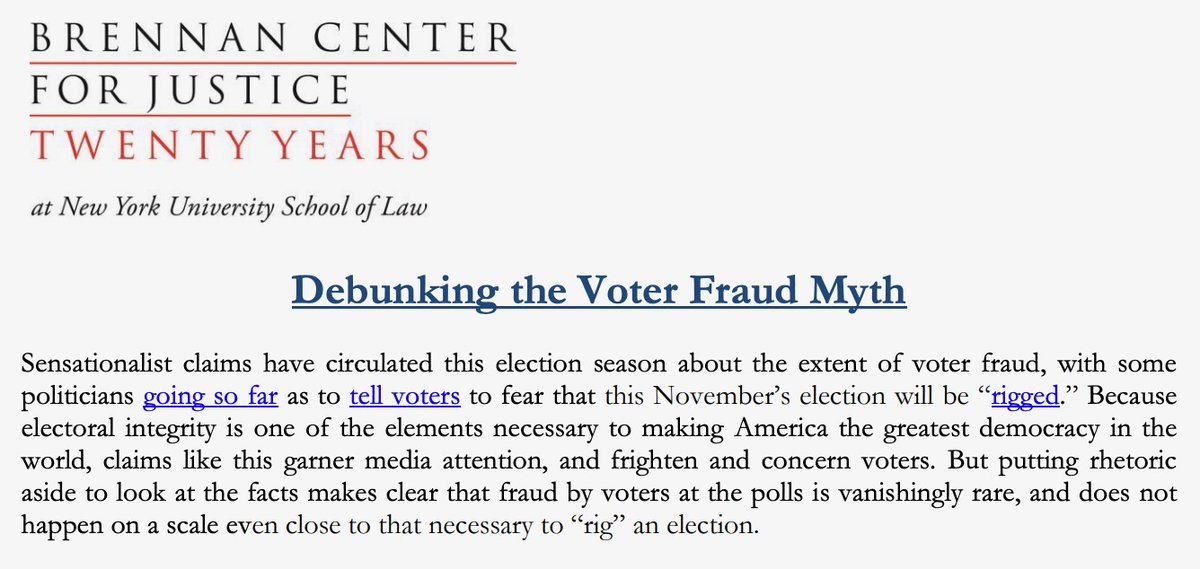
35/
@kirstenfrankly (Chief of Staff, UT GOP Lt. Gov. @SpencerJCox): "there is very little evidence of voter fraud within our mail-in system" (@NBCNews):
nbcnews.com/politics/donal…
@kirstenfrankly (Chief of Staff, UT GOP Lt. Gov. @SpencerJCox): "there is very little evidence of voter fraud within our mail-in system" (@NBCNews):
nbcnews.com/politics/donal…

36/
GOP leaders have long urged their supporters to vote by mail. GOP governors are sounding the call for easy access to mail-in ballots (@DoyleMcManus for @latimes):
latimes.com/politics/story…
GOP leaders have long urged their supporters to vote by mail. GOP governors are sounding the call for easy access to mail-in ballots (@DoyleMcManus for @latimes):
latimes.com/politics/story…
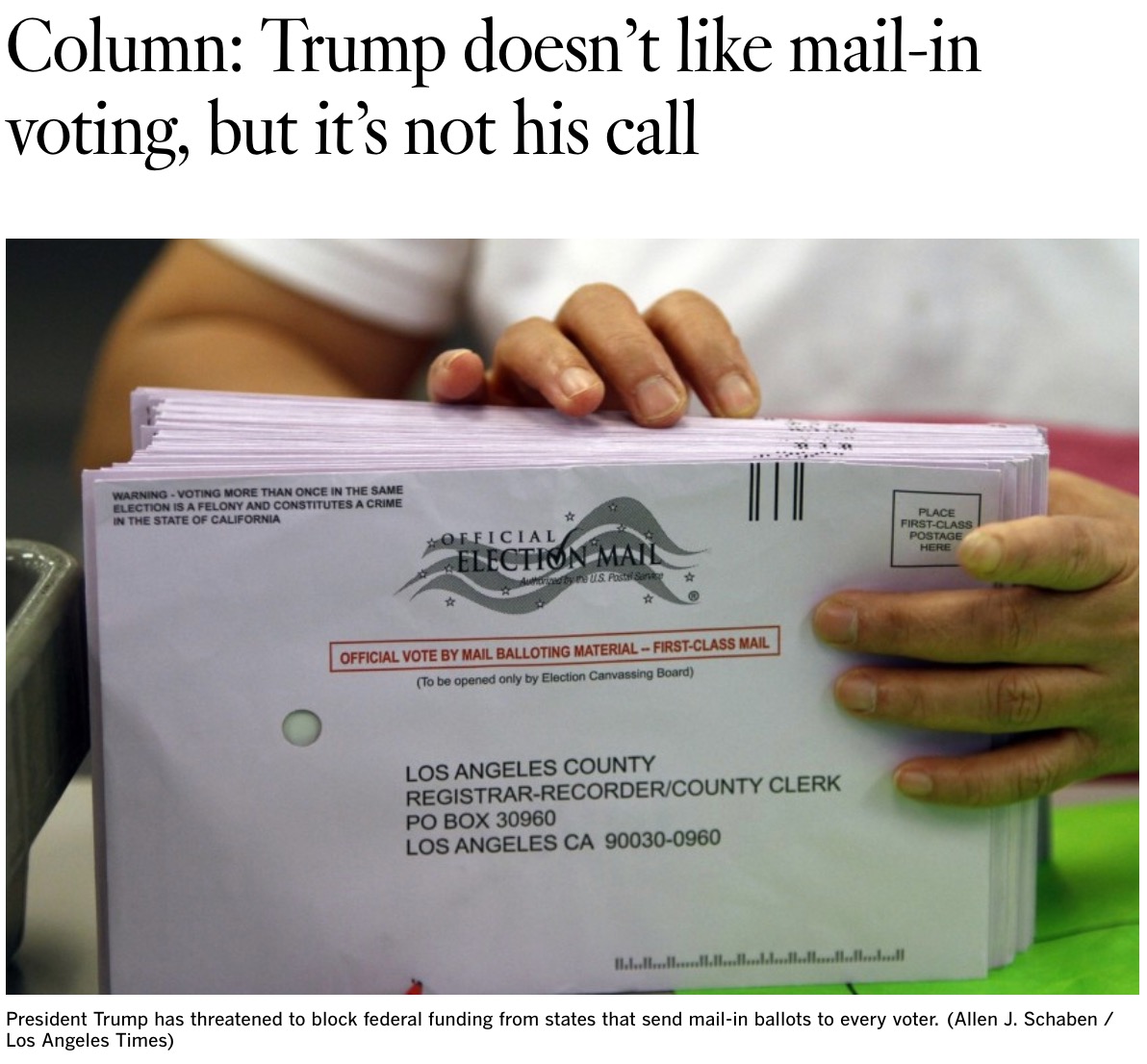
38/
@realDonaldTrump votes by mail (@Yamiche for @PBS):
@realDonaldTrump votes by mail (@Yamiche for @PBS):
https://twitter.com/Yamiche/status/1263198640044195840
39/
@Heritage election fraud database reports just 143 convictions involving fraudulent use of absentee ballots over the past 20 years (approx. 0.00006% of total votes cast):
heritage.org/voterfraud
@Heritage election fraud database reports just 143 convictions involving fraudulent use of absentee ballots over the past 20 years (approx. 0.00006% of total votes cast):
heritage.org/voterfraud

40/
@SenatorRomney says 90% of Utah Republicans vote by mail (@BudrykZack for @thehill):
thehill.com/homenews/senat…
@SenatorRomney says 90% of Utah Republicans vote by mail (@BudrykZack for @thehill):
thehill.com/homenews/senat…

41/
"There is no evidence that mail balloting results in rampant voter fraud" (@AmberMcReynolds & @cstewartiii for @thehill):
thehill.com/opinion/campai…
"There is no evidence that mail balloting results in rampant voter fraud" (@AmberMcReynolds & @cstewartiii for @thehill):
thehill.com/opinion/campai…

42/
Former Republican campaign strategist compares president to "the boy who cried wolf" in spreading panic and undermining faith in the electoral process, to the detriment of his own base. (@grace_panetta for @businessinsider):
businessinsider.com/trumps-crusade…
Former Republican campaign strategist compares president to "the boy who cried wolf" in spreading panic and undermining faith in the electoral process, to the detriment of his own base. (@grace_panetta for @businessinsider):
businessinsider.com/trumps-crusade…

43/
@KimWyman12, Republican @secstatewa, supports vote by mail. (@llerer for @nytimes):
nytimes.com/2020/04/15/us/…
@KimWyman12, Republican @secstatewa, supports vote by mail. (@llerer for @nytimes):
nytimes.com/2020/04/15/us/…
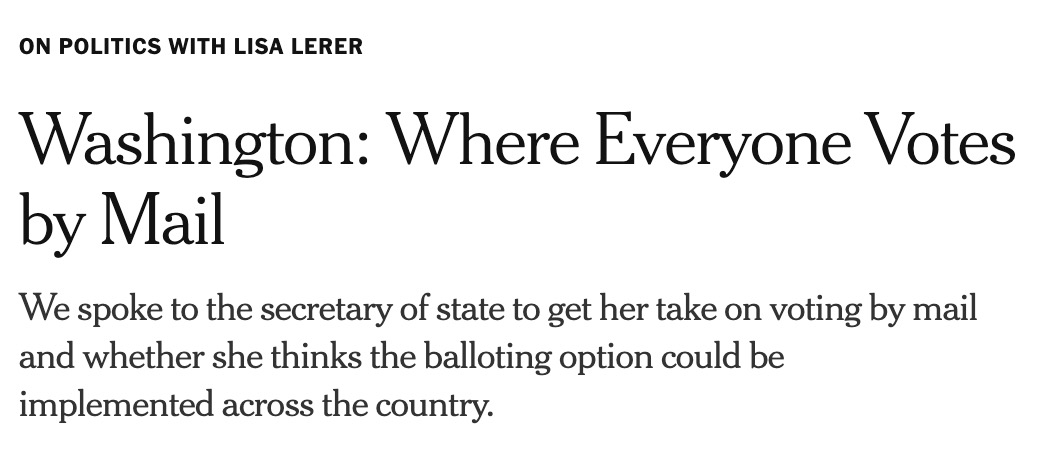
44/
Research on vote by mail shows neutral partisan effects. (May Wong, @SIEPR):
siepr.stanford.edu/news/new-resea…
Research on vote by mail shows neutral partisan effects. (May Wong, @SIEPR):
siepr.stanford.edu/news/new-resea…
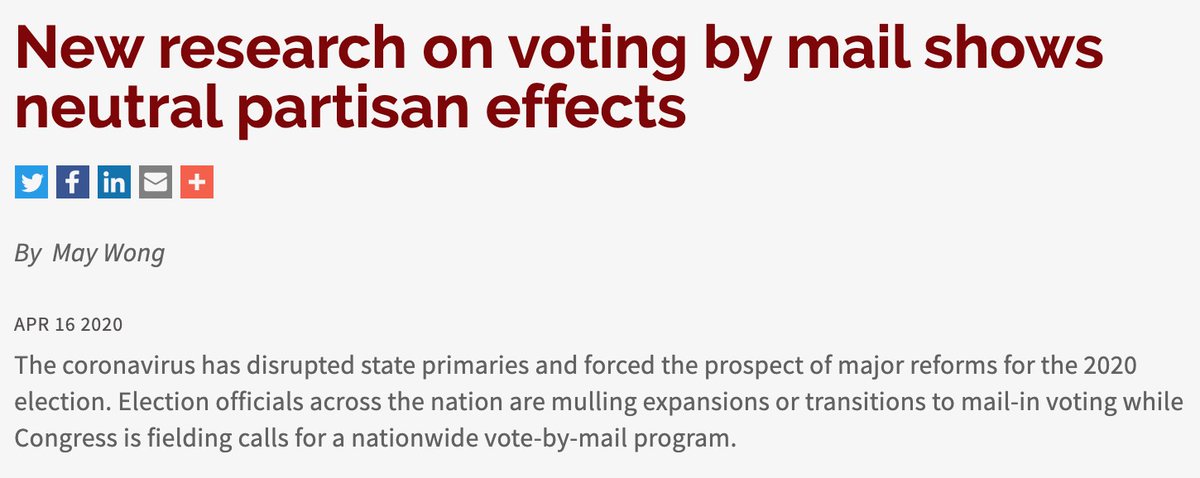
45/
"Trump casts doubt on mail voting. His campaign promotes it." (@NickRiccardi for @AP):
apnews.com/6416231367cfa0…
"Trump casts doubt on mail voting. His campaign promotes it." (@NickRiccardi for @AP):
apnews.com/6416231367cfa0…

46/
In 2017, the risk of mail-in vote fraud was 0.0004% to 0.0009% (@hopeyen1 & Calvin Woodward for @AP Fact Check, quoting @BrennanCenter):
apnews.com/e45b0fd875cd2b…
In 2017, the risk of mail-in vote fraud was 0.0004% to 0.0009% (@hopeyen1 & Calvin Woodward for @AP Fact Check, quoting @BrennanCenter):
apnews.com/e45b0fd875cd2b…

47/
Former Assistant Secretary of Defense under President Reagan, @LarryKorb: "U.S. troops routinely vote by mail. Why can't the rest of America do the same?" (@MilitaryTimes):
militarytimes.com/opinion/commen…
Former Assistant Secretary of Defense under President Reagan, @LarryKorb: "U.S. troops routinely vote by mail. Why can't the rest of America do the same?" (@MilitaryTimes):
militarytimes.com/opinion/commen…

48/
@leedrutman for @FiveThirtyEight: "There is no evidence that vote by mail gives one party an advantage":
fivethirtyeight.com/features/there…
@leedrutman for @FiveThirtyEight: "There is no evidence that vote by mail gives one party an advantage":
fivethirtyeight.com/features/there…

49/
Justin Levitt (@_justinlevitt_): "Each act of voter fraud in connection with a federal election risks 5 years in prison....a single extra vote is simply not worth the price." (@BrennanCenter @nyulaw):
brennancenter.org/sites/default/…
Justin Levitt (@_justinlevitt_): "Each act of voter fraud in connection with a federal election risks 5 years in prison....a single extra vote is simply not worth the price." (@BrennanCenter @nyulaw):
brennancenter.org/sites/default/…

50/
Oh, and I (@EllenLWeintraub) have also spoken on the topic: "Democrats have studied this, Republicans have studied this, and no one can find any evidence of rampant voter fraud either historically or particularly in the 2016 elections."
thehill.com/homenews/admin…
Oh, and I (@EllenLWeintraub) have also spoken on the topic: "Democrats have studied this, Republicans have studied this, and no one can find any evidence of rampant voter fraud either historically or particularly in the 2016 elections."
thehill.com/homenews/admin…

51/
To sum up:
Many Americans will be voting by mail this year. In the 2016 general election, 139 million people voted overall; even more could do so this year.
To sum up:
Many Americans will be voting by mail this year. In the 2016 general election, 139 million people voted overall; even more could do so this year.
52/
With that many voters, could a few instances of illegal voting activity crop up?
Perhaps.
But there is no basis to claim that it will be anything other than exceedingly rare.
With that many voters, could a few instances of illegal voting activity crop up?
Perhaps.
But there is no basis to claim that it will be anything other than exceedingly rare.
53/
Facts matter. Data matters. When Prof. @_justinlevitt_ researched in-person voter fraud between 2000 and 2014, he found just 31 credible allegations – just *allegations*! – out of more than a *billion* ballots cast.
washingtonpost.com/news/wonk/wp/2…
Facts matter. Data matters. When Prof. @_justinlevitt_ researched in-person voter fraud between 2000 and 2014, he found just 31 credible allegations – just *allegations*! – out of more than a *billion* ballots cast.
washingtonpost.com/news/wonk/wp/2…

54/
Research by U. of Wisconsin & Stanford political scientists “indicate[d] that the proportion of the population reporting voter impersonation is indistinguishable from that reporting abduction by extraterrestrials.”
liebertpub.com/doi/abs/10.108…
Research by U. of Wisconsin & Stanford political scientists “indicate[d] that the proportion of the population reporting voter impersonation is indistinguishable from that reporting abduction by extraterrestrials.”
liebertpub.com/doi/abs/10.108…

55/
The numbers are similarly tiny for voting by mail. Even the Heritage Foundation’s voter-fraud database contains only 13 instances of absentee voter fraud across the 5 states that had all-mail balloting going into this year: CO, HI, OR, UT, & WA.
nytimes.com/2020/05/18/opi…
The numbers are similarly tiny for voting by mail. Even the Heritage Foundation’s voter-fraud database contains only 13 instances of absentee voter fraud across the 5 states that had all-mail balloting going into this year: CO, HI, OR, UT, & WA.
nytimes.com/2020/05/18/opi…

56/
Voting by mail will not make the 2020 election substantially fraudulent or massively corrupt.
There is no basis for that claim.
None. Zero. Zip. Nada.
Voting by mail will not make the 2020 election substantially fraudulent or massively corrupt.
There is no basis for that claim.
None. Zero. Zip. Nada.
57/
Specifically:
There is no basis for the claim that the election will be substantially fraudulent or massively corrupt due to mailbox robbery.
There is no basis for the claim that the election will be substantially fraudulent or massively corrupt due to ballot forgery.
Specifically:
There is no basis for the claim that the election will be substantially fraudulent or massively corrupt due to mailbox robbery.
There is no basis for the claim that the election will be substantially fraudulent or massively corrupt due to ballot forgery.
58/
There is no basis for the claim that the election will be substantially fraudulent or massively corrupt due to illegal ballot printing.
There is no basis for the claim that the election will be substantially fraudulent or massively corrupt due to illegal ballot printing.
59/
There is no basis for the claim that the election will be substantially fraudulent or massively corrupt due to fraudulently signed ballots.
There is no basis for the claim that the election will be substantially fraudulent or massively corrupt due to fraudulently signed ballots.
60/
There is no basis for the claim that the election will be substantially fraudulent or massively corrupt due to voters being told for whom to vote.
There is no basis for the claim that the election will be substantially fraudulent or massively corrupt due to voters being told for whom to vote.
61/
There is no basis for the claim that the election will be substantially fraudulent or massively corrupt due to a cheating free-for-all.
There is no basis for the claim that the election will be substantially fraudulent or massively corrupt due to a cheating free-for-all.
62/
There is no basis for the claim that the election will be substantially fraudulent or massively corrupt due to a forgery free-for-all.
There is no basis for the claim that the election will be substantially fraudulent or massively corrupt due to a forgery free-for-all.
63/
There is no basis for the claim that the election will be substantially fraudulent or massively corrupt due to a ballot theft free-for-all.
There is no basis for the claim that the election will be substantially fraudulent or massively corrupt due to a ballot theft free-for-all.
64/
Claims that voter fraud is widespread are, as shown above, “dead wrong,” “crying ‘wolf,’” “false,” “a debunked lie.”
Claims that voter fraud is widespread are, as shown above, “dead wrong,” “crying ‘wolf,’” “false,” “a debunked lie.”
65/
Such falsehoods are not mere words.
These falsehoods may well undermine the American people's faith in our democracy.
And the *real* fraud would be if U.S. citizens were deterred from voting and our government reflected the consent of fewer of the governed.
Such falsehoods are not mere words.
These falsehoods may well undermine the American people's faith in our democracy.
And the *real* fraud would be if U.S. citizens were deterred from voting and our government reflected the consent of fewer of the governed.
66/
True leaders speak truth.
Especially in an election season plagued by pandemic, economic uncertainty, and death, the American people deserve nothing less than the truth from our leaders.
True leaders speak truth.
Especially in an election season plagued by pandemic, economic uncertainty, and death, the American people deserve nothing less than the truth from our leaders.
• • •
Missing some Tweet in this thread? You can try to
force a refresh

